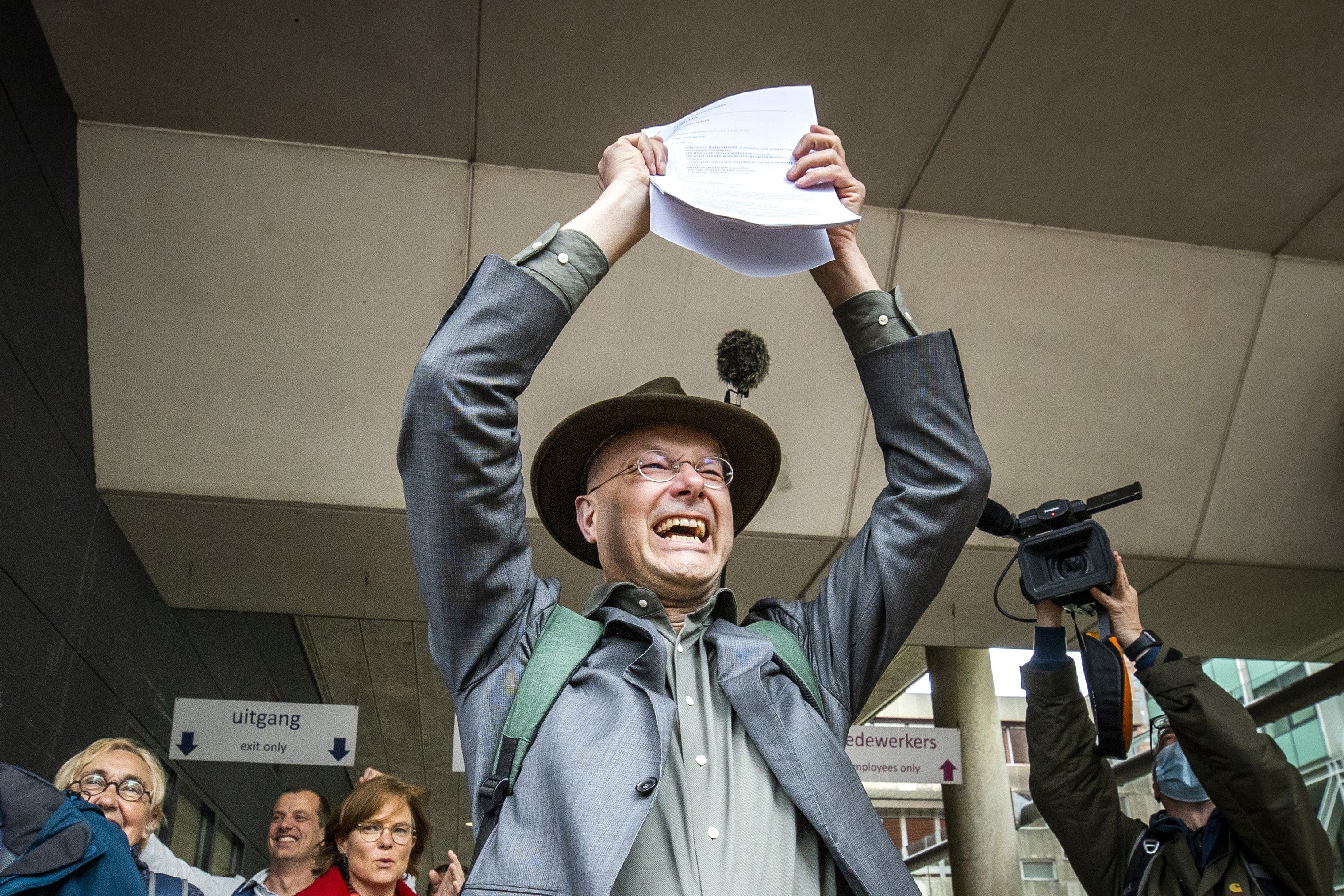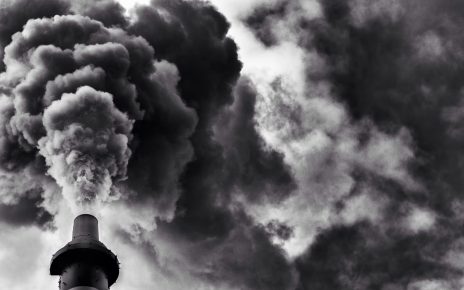
For the first time in history, a court yesterday ordered a private company, rather than a government, to curb its planet-warming pollution.
Royal Dutch Shell PLC must slash its greenhouse gas emissions 45% by 2030 from 2019 levels, The Hague District Court ruled in a decision that could reverberate around the world.
“This is a turning point in history,” Roger Cox, a lawyer for the nonprofit Friends of the Earth Netherlands, said in a statement after the decision. “This case is unique because it is the first time a judge has ordered a large polluting corporation to comply with the Paris Climate Agreement. This ruling may also have major consequences for other big polluters.”
Milieudefensie, the Dutch arm of Friends of the Earth, filed the closely watched lawsuit in 2019. Six environmental groups and more than 17,000 Dutch citizens joined the complaint, which alleged that Shell’s business practices violated human rights laws in the Netherlands and the European Union.
The oil supermajor had already committed in September to reaching net-zero emissions by 2050, with a 20% reduction in carbon intensity by 2030. But environmental challengers argued that Shell’s continued investments in fossil fuel production showed the company wasn’t moving fast enough to meet its own net-zero target or the goals of the Paris Agreement.
The three-judge panel of The Hague District Court agreed.
“The court orders Royal Dutch Shell, by means of its corporate policy, to reduce its CO2 emissions by 45% by 2030 with respect to the level of 2019 for the Shell group and the suppliers and customers of the group,” said Judge Larisa Alwin, who read out the ruling at a hearing yesterday.
The decision will have “far-reaching consequences” for the company and may “curb the potential growth of the Shell group,” Alwin added.
Shell immediately indicated plans to appeal the ruling to the Supreme Court of the Netherlands.
“Urgent action is needed on climate change which is why we have accelerated our efforts to become a net-zero emissions energy company by 2050, in step with society, with short-term targets to track our progress,” a Shell spokesperson said in a statement yesterday.
“We are investing billions of dollars in low-carbon energy, including electric vehicle charging, hydrogen, renewables and biofuels,” the spokesperson added. “We want to grow demand for these products and scale up our new energy businesses even more quickly. We will continue to focus on these efforts and fully expect to appeal today’s disappointing court decision.”
A far-reaching order
The verdict was notable for its emphasis on Scope 3 emissions, which include the emissions generated by customers and suppliers of petroleum products, such as drivers filling their cars with gasoline.
“[I]t is widely accepted internationally that companies bear responsibility with regard to Scope 3 emissions,” the ruling says, adding, “This need is more strongly felt in cases where these emissions make up the lion’s share of a company’s CO2 emissions, as is the case with companies that produce and sell fossil fuels. At the Shell group, approximately 85% of its emissions are Scope 3 emissions.”
Pete Erickson, who leads the climate policy program at the Stockholm Environment Institute in Seattle, called the court’s language “striking.”
“This ruling is incredible,” Erickson said in a phone interview. “It includes the CO2 that comes out of an automobile tailpipe, for example. That was oil that was originally pulled out of the ground by Shell.”
Lars Eirik Nicolaisen, deputy CEO of the data firm Rystad Energy, said there are parallels between the litigation against Shell and major tobacco companies, which were forced to pay $206 billion for deceiving consumers about the harmful health effects of smoking cigarettes (Climatewire, March 10).
“When it comes to Scope 3 emissions, although a very different market, there is some analogy to the tobacco industry, where producers became more liable for the choices of their customers,” Nicolaisen said in an emailed statement.
At oral arguments in Milieudefensie v. Shell last year, lawyers for the oil firm contended that if the company were forced to reduce its fossil fuel production, competitors would increase their production and make up the difference (Climatewire, Dec. 2, 2020).
The court firmly rejected this reasoning.
“This argument assumes perfect substitution, where the Shell group will be replaced one on one by others,” the three-judge panel wrote. “However, it is very doubtful whether this phenomenon will occur.”
Erickson said he thinks the ruling “helps solidify the idea that leaving oil in the ground in one place does help reduce oil consumption globally, and that’s a valid part of the way to get to net zero.”
U.S. ripple effect
The ruling could inspire similar litigation against fossil fuel firms in the United States and around the world, said Markus Gehring, a lecturer at the University of Cambridge’s Centre for European Legal Studies.
“Think of all the companies that contribute to climate change. They could be committing a tort unless they’re complying with the Paris Agreement,” Gehring said in a phone interview. “So suddenly, the Paris Agreement has a lot more bite.”
Michael Burger, executive director of Columbia Law School’s Sabin Center for Climate Change Law, agreed with that assessment.
“The Dutch court ruled that Shell has the duty of care [to combat climate change] under Dutch law. And there may or may not be provisions similar to the duty of care in other countries,” Burger said in a phone interview.
“But I do think that this case will provoke environmentalists, citizens and organizations in other countries to explore the possibility of bringing a similar suit,” said Burger, who serves as counsel at Sher Edling LLP, a law firm that represents U.S. challengers in climate liability litigation.
Legal precedent in the Netherlands is not binding in other countries. But if the Supreme Court of the Netherlands upholds the ruling on appeal, courts in other nations would pay attention, Gehring said.
“Once you have a Supreme Court judgment of an E.U. country, I would say the world listens,” he said.
The Supreme Court of the Netherlands previously issued a historic climate ruling in 2019. The decision in Urgenda Foundation v. State of the Netherlands forced the Dutch government to do more to cut greenhouse gas emissions after environmentalists sued lawmakers over their alleged inaction (Climatewire, Dec. 23, 2019).
In the United States, five states and more than a dozen municipalities have sued oil and gas companies over their contribution to—and alleged deception about—the dangers of global warming. The challengers are asking the fossil fuel firms to help cover the costs of addressing floods, wildfires and other disasters fueled by rising global temperatures.
Those lawsuits are mired in procedural wrangling over whether the cases will be heard in state or federal court.
Outside the courtroom, oil supermajors are facing mounting pressure from investors to address the risks that climate change poses to their business. Exxon Mobil Corp. shareholders yesterday voted to add at least two new independent directors to the company’s board following a pressure campaign by a small hedge fund dissatisfied with the company’s management of climate issues (see related story).
Yesterday was “a major day in the history of the fossil fuel industry,” Burger said. “These are major developments that do reflect an increasing awareness of fossil fuel companies’ obligations to account for and address the emissions associated with their products.”
Reprinted from E&E News with permission from POLITICO, LLC. Copyright 2021. E&E News provides essential news for energy and environment professionals.



